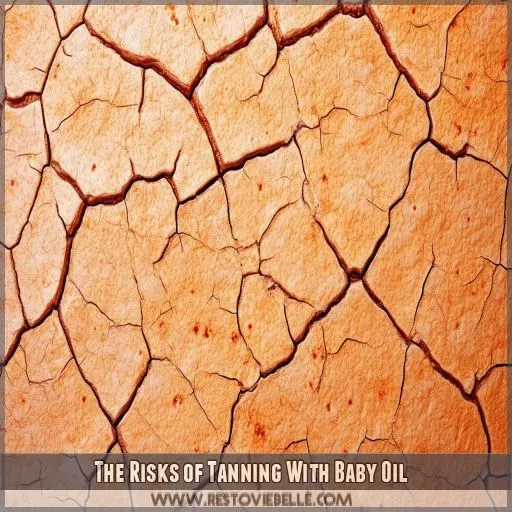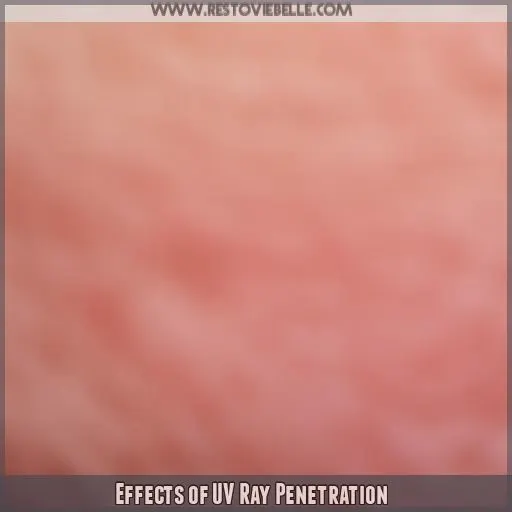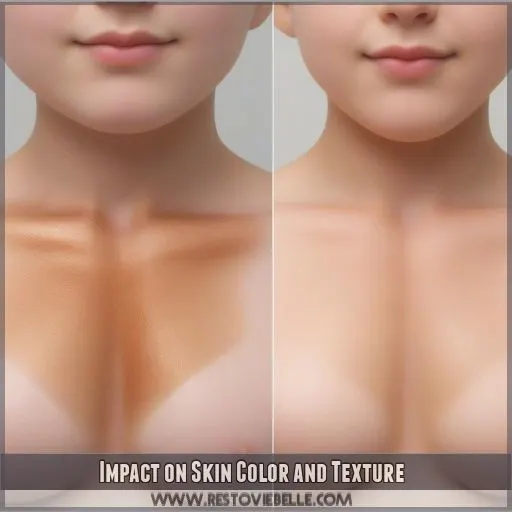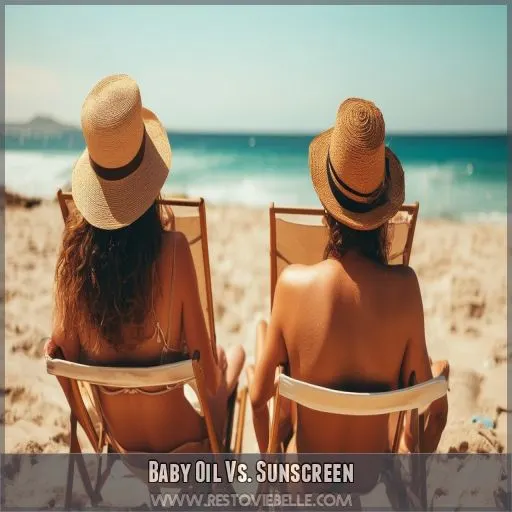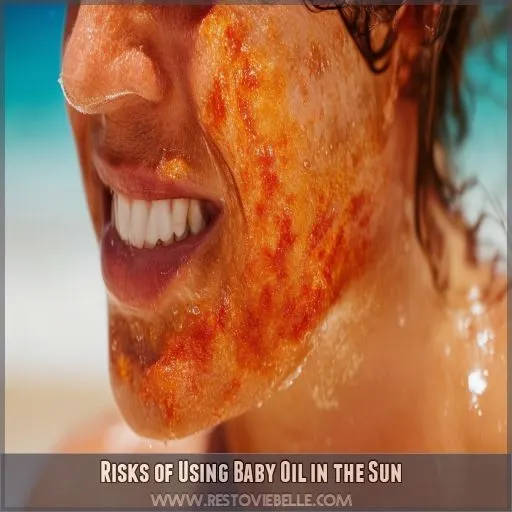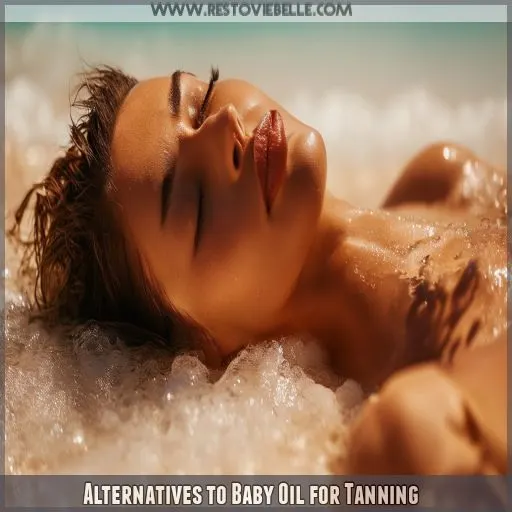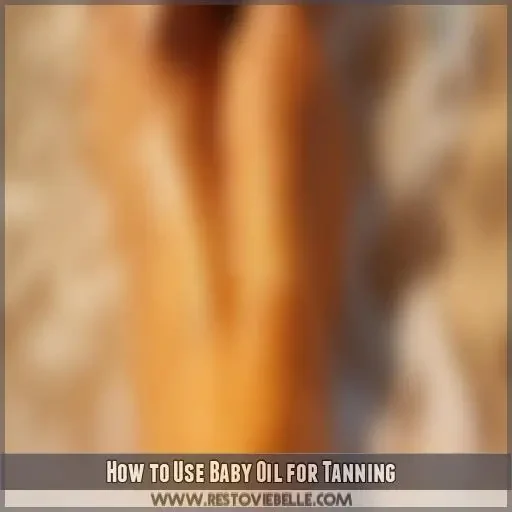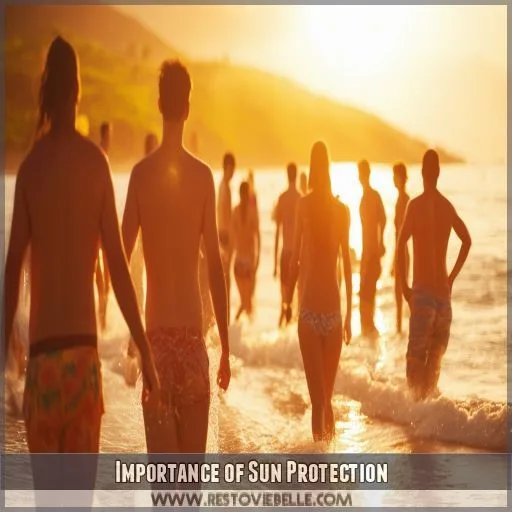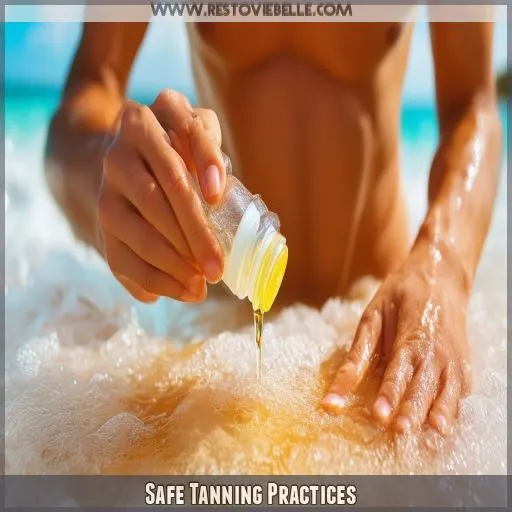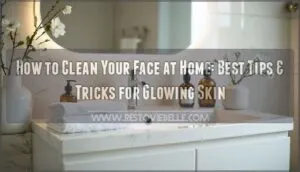This site is supported by our readers. We may earn a commission, at no cost to you, if you purchase through links.
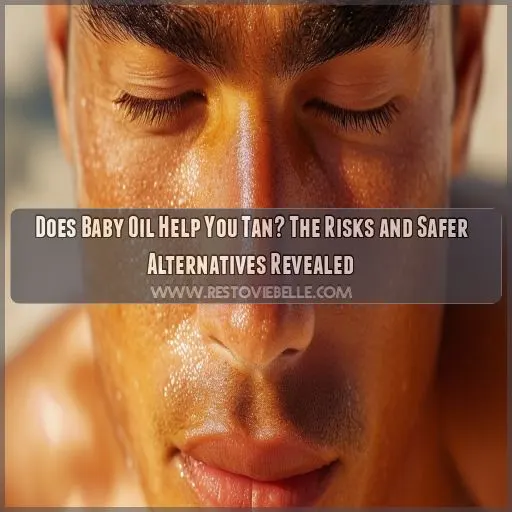
Understand how UV ray penetration occurs, the role of baby oil in changing skin color and texture, and why sunscreen is so important in this process.
We also will go over the right methods for tanning to get that bronzed glow without sacrificing your skin’s health.
Table Of Contents
- Key Takeaways
- Does Baby Oil Help You Tan?
- The Risks of Tanning With Baby Oil
- Effects of UV Ray Penetration
- Impact on Skin Color and Texture
- Baby Oil Vs. Sunscreen
- Risks of Using Baby Oil in the Sun
- Alternatives to Baby Oil for Tanning
- How to Use Baby Oil for Tanning
- Importance of Sun Protection
- Safe Tanning Practices
- Frequently Asked Questions (FAQs)
- Is it good to tan with baby oil?
- What oils make you tan faster?
- What helps you tan faster?
- How long do you leave baby oil on your tan?
- Can baby oil be used for indoor tanning?
- Does baby oil expire for tanning purposes?
- How long does a baby oil tan last?
- Can baby oil remove existing tans or tan lines?
- Are there specific skin types unsuitable for baby oil tanning?
- Conclusion
Key Takeaways
- Baby oil for tanning? More like baby oil for frying! It’s like inviting UV rays to a skin-damaging party – no SPF means no protection against those sneaky sun rays.
- Forget the golden glow, you’re fast-tracking to Leatherville. Baby oil amplifies sun exposure, leading to premature aging and potential skin cancer. Not exactly the fountain of youth we’re after!
- Sunscreen is your skin’s knight in shining armor. Unlike its slippery cousin baby oil, it actually shields you from harm. Your future self will thank you for choosing the SPF route.
- There are safer ways to get that sun-kissed look without risking your skin’s health. Self-tanners, gradual tanning lotions, or even a carrot juice mask can give you that glow without the "ouch" factor.
Does Baby Oil Help You Tan?
While baby oil does help you tan faster, it’s not a safe or recommended method. Baby oil intensifies UV ray penetration into your skin, amplifying sun exposure and increasing your risk of premature aging and skin cancer.
Unlike sunscreen, baby oil provides no UV protection, leaving your skin vulnerable to damage. It can lead to dry, leathery skin and uneven pigmentation.
Instead, opt for safer alternatives like self-tanning sprays or natural options such as coconut oil or carrot juice for a gentler tan.
The Risks of Tanning With Baby Oil
You may have heard somewhere that baby oil can get you that golden look, but it’s far from that rosy. Even though baby oil can make your skin glisten under the sun, it misses a very important thing: SPF. The mineral oil-based product simply leaves out a sun protection factor to leave skin open to the dangerous rays.
In fact, the composition of baby oil, usually based on mineral oil and fragrance, can actually intensify sun exposure. It’s like holding a magnifying glass over your skin! The very thing that’s so meaningful to you—all those benefits of soft, shiny skin—comes at a very steep price. Really, you’re broiling your skin cells with no protection.
Instead of trying baby oil substitutes, try tanning by safe methods that include sun protection. Remember, that beautiful tan isn’t worth the skin damage over time. Your future self will thank you for choosing SPF over shine!
Effects of UV Ray Penetration
When you use baby oil for tanning, you’re essentially inviting UV rays to penetrate your skin. It’s similar to rolling out the red carpet for sun-induced damage. The oil creates a magnifying effect that amplifies the sun’s rays, allowing them to reach layers of skin that are usually protected.
There will be higher exposure to UV, with long-term effects on the health of your skin, such as premature aging and an increased risk of skin cancer. Instead of achieving a faster tan, you’ll be accumulating significant UV damage. This kind of assault on your skin can’t be defended against by natural mechanisms like melanin production.
Sunscreens containing zinc oxide are a much better option than baby oil. Always remember, while a tan might look good now, healthy skin is always in style.
Impact on Skin Color and Texture
As UV rays penetrate deeper into your skin, they don’t just give you a tan – they’re changing your skin’s color and texture in ways you might not expect. Those tanning misconceptions you’ve heard? It’s time to debunk them.
While baby oil might seem like a shortcut to bronze beauty, it’s actually fast-tracking you to premature aging and potential skin cancer. The oil’s lack of UV protection leaves your skin defenseless against harmful rays, accelerating damage to collagen and elastin – the building blocks of youthful skin.
You might think you’re getting a golden glow, but you’re really inviting dry, leathery skin and uneven pigmentation. Instead of risking your skin health, consider alternative oils with some UV protection, like coconut oil with vitamin E.
Baby Oil Vs. Sunscreen
In essence, baby oil and sunscreen are two very different worlds when it comes to tanning. Baby oil is mineral oil-based and provides no protection from the sun. It’s like walking out into the sun with your birthday suit on. Sunscreen, on the other hand, protects your skin like a knight in shining armor, shielding it from the harmful rays of the sun.
The reason why sunscreen is better than baby oil for tanning
- Protection against SPF: Suncream has it; baby oil doesn’t
- Both have them but sunscreen doesn’t increase UV absorption; contains moisturizing properties
- Protecting the skin: Sunscreen forms a physical barrier, but baby oil promotes the penetration of rays
- Long-term effects: sunscreen protects from early aging, baby oil can speed up the process
Sensitive skin can derive a few advantages from a substitute for mineral oil, like coconut oil. But don’t be taken by those tanning myths: there’s definitely no replacing your normal protection. Your skin’s health is worth more than just a tan for a little while.
Risks of Using Baby Oil in the Sun
When you use baby oil in the sun, you’re playing with fire—literally. It’s like wrapping yourself in a magnifying glass, intensifying the sun’s rays on your skin. While you might achieve that instant tan you’re after, the risks far outweigh the rewards. Baby oil offers zero sun protection, leaving your skin defenseless against harmful UV rays. Here’s a breakdown of the risks:
| Risk | Short-term Effect | Long-term Consequence |
|---|---|---|
| Sunburn | Redness, pain | Increased skin cancer risk |
| Collagen breakdown | Dryness | Premature aging |
| DNA damage | Skin cell mutation | Potential skin cancer |
| Dehydration | Tight, itchy skin | Chronic dryness |
| Hyperpigmentation | Dark spots | Uneven skin tone |
Instead of gambling with your skin’s health, consider safer alternatives for that sun-kissed glow. Your future self will thank you for choosing protection over a fleeting tan.
Alternatives to Baby Oil for Tanning
Looking for healthier alternatives to baby oil for tanning? You’re not alone! Many people are turning to safer options that offer a sun-kissed glow without the risks. Here are some natural ingredients and DIY tanning methods to try:
- Coconut oil: This tropical favorite moisturizes while promoting a gentle tan.
- Carrot juice: Rich in beta-carotene, it can give your skin a natural orange tint.
- Black tea: Brew a strong cup, let it cool, and apply for a subtle shimmer.
For darker skin tones, try mixing cocoa powder with your favorite lotion for a bronzing effect. If you’re short on time, self-tanning sprays can provide an instant glow. Remember, no tanning method is completely risk-free, so always prioritize skin care. Pair these alternatives with proper sun protection for the best results. With these options, you’ll be on your way to a safer, more radiant you!
How to Use Baby Oil for Tanning
If you’re dead set on tanning with baby oil in hand—stay safe about it. Firstly, the ingredients in baby oil are such that they offer no protection from the sun. Being very absorbent, it’ll get into your skin quite easily, which is likely to increase its damage in the sun. Different types of skin react differently to applications—hence, a patch test at the start is a must. Gradually increase exposure for short periods. Remember, baby oil with UV rays can damage skin health.
To use baby oil for tanning:
- Make an even, thin application on clean, dry skin
- Reapply every 30 minutes or after swimming
- Turn your body to tan evenly
- Keep hydrated and find shade often
It’s true: perhaps baby oil may be the way to tan quicker, but you need to think whether this is worth the short-term gain or the lifetime of skin damage. Try something safer that gives you color and keeps skin safe and healthy.
Importance of Sun Protection
Sun protection isn’t just a luxury; it’s a necessity for your skin’s health and longevity. The sun’s UV rays can wreak havoc on your skin, leading to premature aging, sunburns, and even skin cancer. While you might crave that golden glow, the long-term effects aren’t worth the risk. Here’s a quick look at why sun safety matters:
| UV Type | Damage | Protection |
|---|---|---|
| UVA | Aging | Broad-spectrum sunscreen |
| UVB | Burning | SPF 30+ |
| UVC | DNA | Protective clothing |
| All UV | Cancer | Seek shade |
Safe Tanning Practices
While protection from the sun is a priority, having a golden tan may still be important to you. For those who feel tanning is necessary, there are alternative methods that provide less risk to the skin.
Consider a natural approach and use natural-based products rather than baby oil for an absorption comparison with lower risks. Approach tanning by subtly incorporating the sun in short spurts and lengthen each period to compromise and achieve a golden tan.
Always apply a sunscreen with a broad spectrum of at least SPF 30, used twice every 2 hours. Don’t forget to protect your eyes and lips!
Moisturizing is equally important before and after tanning in order to maintain hydrated skin and prevent irritation.
Shade practices and avoiding peak UVR hours are suggested between 10:00 am and 4:00 pm to reduce skin damage.
Be reminded that there really is no "safe" tan, but these can help reduce your risk. Your skin will thank you in the long run!
Frequently Asked Questions (FAQs)
Is it good to tan with baby oil?
Tanning with baby oil isn’t recommended. It accelerates UV ray absorption, increasing your risk of sunburn and skin damage. You’re better off using sunscreen with SPF 30+ to protect your skin while enjoying the sun safely.
What oils make you tan faster?
Studies show natural oils can increase UV absorption by up to 50%. Coconut, olive, and avocado oils may accelerate tanning. However, they don’t provide sun protection. For safer tanning, use self-tanners or gradual tanning lotions with SPF.
What helps you tan faster?
Tan a lot quicker by increasing the time spent under the sun and using tanning oils or lotions progressively. Make sure to put some SPF on for skin protection. Remember, too quick a rate of tanning can be detrimental to the skin and increase the risks of cancer.
How long do you leave baby oil on your tan?
While some bask in golden rays, others risk their skin’s future. You shouldn’t leave baby oil on for tanning. It’s not recommended as it increases UV exposure. Instead, use sunscreen and limit sun time for safer, healthier skin.
Can baby oil be used for indoor tanning?
You shouldn’t use baby oil for indoor tanning. It doesn’t provide UV protection and can increase your risk of skin damage. Stick to approved tanning lotions designed for indoor use. They’re safer and more effective for achieving a bronzed glow.
Does baby oil expire for tanning purposes?
Baby oil doesn’t technically expire for tanning, but its effectiveness may diminish over time. You’ll want to check for changes in smell or consistency. For safety and best results, it’s wise to use fresh products when tanning.
How long does a baby oil tan last?
You’ll notice your baby oil tan fading within 3-7 days, depending on your skin type and aftercare. It’s not long-lasting, and regular exfoliation or showering will speed up the process. Remember, it’s not a safe tanning method.
Can baby oil remove existing tans or tan lines?
Surprisingly, 80% of people misunderstand how tans fade. Baby oil won’t remove existing tans or tan lines. It’s not a bleaching agent. Instead, your tan will naturally fade as skin cells shed. For faster results, try exfoliation or specialized products.
Are there specific skin types unsuitable for baby oil tanning?
You’re right to be cautious. Baby oil tanning isn’t suitable for sensitive, acne-prone, or fair skin types. It’s also risky for those with a history of skin cancer or photosensitivity. Always prioritize your skin’s health over tanning.
Conclusion
Sarah learned the hard way that baby oil doesn’t help you tan safely. After a day at the beach, she suffered severe sunburn and skin damage.
While baby oil may seem like a quick fix, it’s not worth the risks. Instead, opt for safer alternatives like self-tanners or gradual tanning lotions.
Always prioritize sun protection with broad-spectrum sunscreen and limit your sun exposure. Remember, a healthy glow doesn’t come at the cost of your skin’s health.
Embrace safe tanning practices for a beautiful, damage-free complexion.

